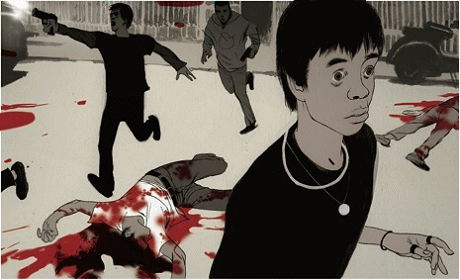“The first thing you should know about Gomorrah,” says New Yorker critic Anthony Lane, “is that no fewer than three members of its cast have been arrested on suspicion of illegal activities. There could be no more unimpeachable testament, surely, to the integrity of Matteo Garrone‘s film, which is about organized crime in Naples. Many of the actors were recruited from the area, presumably on the basis that they already knew the ropes, not to mention the Kalashnikovs.

“There are five stories, layered and stuck together, raising the possibility that Garrone modelled the whole thing on a lasagna verde. We get them morsel by morsel, and the brisk dicing between them can catch the viewer unprepared.
“There is Toto (Salvatore Abruzzese), age thirteen, who spies a dropped gun in the street, returns it to local thugs, and, in reward, becomes a mini-mule in the drug trade. There is a pair of teen-agers, Marco (Marco Macor) and Ciro (Ciro Petrone), fools in love with a gangsterish ideal; “I’m numbah one! Tony Montana!” they cry, acting out their pantomime of Scarface in an empty tenement, where a sunken, unused bath echoes not just old Brian De Palma movies but much older tubs, in the balneae of Pompeii, across the bay.
“There is also Don Ciro (Gianfelice Imparato), whose name hints at potency, but who is, in fact, a frightened hireling in a cheap blouson, distributing cash to those families who exist on the say-so of the Camorra. And there is Franco (Toni Servillo), the most accomplished gentleman on view, and the one most at ease with evil; aided by a reluctant sidekick, Roberto (Carmine Paternoster), he arranges for the disposal of industrial waste. That sounds like a filmmaker’s convenient symbol, but, if you live in certain parts of southern Italy, the poisoning of the land is right in front of your nose, and under your skin.
“Last, and best, of the central figures is Pasquale, played by Salvatore Canta-lupo. (Has any bunch of actors had better names?) Pasquale is a Thurberish drone, keeping his head down but unable to stop lifting up his eyes to resplendent things. He is a tailor, working his fingers off in the service of couture, or, rather, of its speedy, backroom simulacrum. In a bid to earn more, he accepts a secret offer to tutor Chinese immigrants in his delicate art, and what follows is a touching nocturnal farce. Bundled into the trunk of a car, he arrives not at some dripping sweatshop but at a spotless workplace, lined with eager apprentices who applaud his entrance as though he had come to conduct them: ‘They called me Maestro!’ he whispers to his wife, creeping back at dawn.
“Moments like this achieve what so few American movies seem to be doing just now: they take on a big subject, unwieldy and unglamorous — in this case, the illegal economies that thrive under globalization, and on which we unwittingly feed — and dig out from it a cluster of private dramas that are highly specific, and yet which could, you feel, find an answering gleam almost anywhere on the planet.
“Toward the close, at a truck stop, Pasquale glances at a TV and sees a clip of a radiant Scarlett Johansson parading at a movie premi√®re, wearing a dress that he himself ran up at cut price, or perhaps its costlier identical twin; the expression on the tailor’s face is, you might say, his final master class, proving the beauty of ruefulness.”












